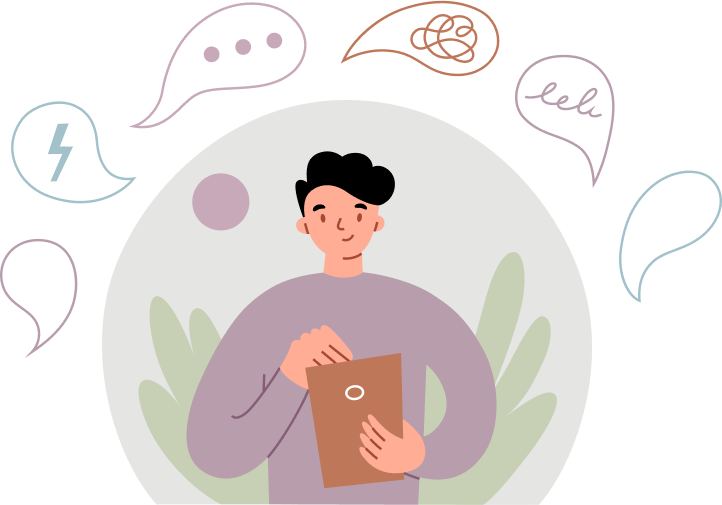Managing anxiety as a man: tools and therapy options
Anxiety is one of the most prevalent mental health struggles that men face, yet it often remains hidden beneath the surface. Far too often, it's dismissed as "just stress" or "handling business," when in reality, anxiety can have a profound impact on a man's mental and physical well-being, relationships, and professional life. This article aims to help men recognize anxiety for what it truly is, identify its signs, and equip themselves with both practical tools and therapy options to manage it effectively. Our goal is to create a supportive space, assuring every man that anxiety is a treatable condition, and there’s help available.

Recognizing the signs of anxiety
Anxiety affects everyone, but its presentation in men can sometimes differ from how it’s commonly portrayed. It often manifests through physical symptoms or irritability, rather than overt worry or fear. For men, it’s essential to recognize the signs—whether physical, psychological, or behavioral.
Common physical symptoms men frequently experience:
Tense muscles: Persistent tightness, particularly in the neck, shoulders, and jaw, which can lead to discomfort or pain.
Headaches: Chronic tension headaches or migraines, sometimes occurring daily.
Chest tightness or heart palpitations: A racing heart, shortness of breath, or pressure in the chest, which might be mistaken for cardiac problems.
Digestive issues: Conditions like irritable bowel syndrome (IBS), nausea, or indigestion, with no apparent physical cause.
Restlessness: A constant feeling of needing to move or a sense of being "on edge."
Fatigue: Despite adequate rest, a lingering sense of exhaustion because anxiety drains both mentally and physically.
Common psychological and behavioral signs:
Racing thoughts: The feeling of your mind constantly running, replaying situations, or imagining worst-case scenarios.
Difficulty relaxing: A constant state of alertness that makes it hard to unwind, even during relaxation time.
Constant worry: Excessive, disproportionate concern about everyday life—work, finances, relationships, and more.
Irritability or anger: A low tolerance for frustration or anger that surfaces more quickly than usual.
Sleep disturbances: Trouble falling asleep, staying asleep, or experiencing restless, unrefreshing sleep because your mind replays worries.
Difficulty concentrating: Struggling to focus, leading to reduced productivity at work or in personal activities.
Avoidance behaviors: Steering clear of social situations or challenges that trigger anxiety, leading to isolation.
Increased substance use: Turning to alcohol, drugs, or excessive caffeine to manage anxiety or "quiet" racing thoughts.
If these symptoms persist for weeks or begin to interfere with daily life, relationships, or work performance, it’s essential to seek help. These aren’t signs of weakness, but rather signals from your body and mind that need attention and care.
Self-help strategies to manage anxiety
While professional help is incredibly valuable, there are practical, everyday strategies you can use to manage anxiety and build resilience. These tools can help you feel more in control and reduce anxiety’s grip.
Breathing exercises: One of the quickest ways to calm your nervous system is through controlled breathing. Slow, deep breaths activate the relaxation response in your body.
Technique: Try the “4-7-8” breathing method. Inhale deeply through your nose for 4 counts, hold for 7, and then exhale slowly through your mouth for 8 counts. Repeat several times. Doing this for a few minutes daily can help improve its effectiveness.
Progressive muscle relaxation (PMR): Anxiety often shows up as physical tension. PMR is a great way to relax your muscles and relieve stress.
Technique: Begin with your toes, tensing them for 5-10 seconds, then relax. Move up your body, tensing and releasing each muscle group. There are many guided PMR exercises available online to help you with this.
Regular physical activity: Exercise is one of the most powerful natural stress relievers and mood boosters. It reduces stress hormones and releases endorphins, improving your overall mood.
Recommendation: Aim for 30 minutes of moderate exercise several times a week. Whether it’s walking, running, cycling, or weightlifting, find an activity you enjoy to stay consistent.
Mindfulness techniques: Mindfulness brings your focus to the present moment, breaking the cycle of racing thoughts and constant worry.
Tools: Use apps like Calm, Headspace, or Insight Timer for guided meditation. Even small activities like paying full attention while eating or going for a mindful walk can reduce stress.
Limit stimulants: Caffeine, nicotine, and energy drinks can exacerbate anxiety. Consider cutting back, especially later in the day.
Prioritize sleep: Sleep deprivation worsens anxiety. Establish a consistent sleep routine and create a relaxing bedtime environment to improve your sleep quality.
Healthy diet: A balanced diet supports mental health. Eat whole foods, fruits, and vegetables, while minimizing processed foods and sugars, which can negatively affect mood.
Try experimenting with these tools to see what works best for you. Consistency is key to building long-term anxiety resilience.

How therapy can help men with anxiety
While self-help strategies are useful, professional therapy offers a more structured path to managing anxiety, particularly when symptoms are persistent. Therapy provides a safe, non-judgmental space where you can explore the root causes of your anxiety and learn effective coping strategies.
Here’s how therapy can help:
Identifying triggers and patterns: A therapist helps you pinpoint the specific thoughts, situations, or emotions that trigger your anxiety, and works with you to break the cycle.
Cognitive behavioral therapy (CBT): CBT is one of the most effective treatments for anxiety. It teaches you to recognize and challenge distorted thinking patterns, replacing them with more balanced and realistic thoughts. This reduces the intensity of your anxiety.
Exposure therapy: For specific fears, exposure therapy helps you gradually confront what triggers anxiety in a safe, controlled way. Over time, this can reduce the intensity of your fear.
Skill building: Therapy isn’t just talking. It’s about learning skills like emotional regulation, assertive communication, and stress management to tackle anxiety more effectively.
Addressing root causes: Beyond managing symptoms, therapy explores deeper issues that might contribute to anxiety, such as past trauma, perfectionism, or unhealthy thought patterns.
Therapy empowers you to face anxiety head-on, giving you tools to reduce its impact on your life.
Benefits of online therapy for anxiety
For many men, online therapy offers a unique set of advantages that make it a preferred option for managing anxiety. It eliminates many common barriers to seeking help and adds flexibility and privacy.
Here’s why online therapy is often preferred by men with anxiety:
Enhanced privacy and discretion: Online therapy provides a greater sense of anonymity, allowing you to attend sessions from the privacy of your home. This can reduce the stigma that some men feel when seeking mental health support.
Unparalleled flexibility: Online therapy fits into your schedule, whether it’s before work, during lunch, or after hours. This is especially useful for men with busy careers or family commitments.
Eliminates commute and logistics: There’s no travel time or need for parking. Online therapy saves valuable time and makes it easier to commit to regular sessions, which is crucial for anxiety management.
Comfort of a familiar environment: Being in your own space can help you feel more relaxed, making it easier to open up. For those with social anxiety or agoraphobia, this can be a game-changer.
Wider choice of therapists: Online platforms allow you to connect with therapists who specialize in anxiety, and you can choose a therapist that suits your preferences, even if they’re not available locally.
Messaging between sessions: Many online therapy platforms offer the option for secure messaging between scheduled video sessions. This can provide ongoing support, allow for quick check-ins, or enable you to share thoughts or questions as they arise, fostering a continuous connection with your therapist.
Lowered initial barrier: For men hesitant to start therapy, the ease of signing up online and attending an initial session from home can feel like a less intimidating first step compared to making an in-person appointment.
Considering an introductory online session can be a low-pressure way to experience the benefits firsthand and determine if it’s the right fit for your anxiety management journey.
First steps toward getting help
Taking the initiative to address anxiety is a powerful act of self-care and strength. You don’t have to wait until anxiety becomes overwhelming or debilitating before seeking support. Even small, incremental steps can lead to significant positive change.
Here are clear, actionable suggestions to begin your journey toward managing anxiety:
Take a reputable online screening quiz: Many trusted mental health organizations offer free, confidential online screening quizzes for anxiety (e.g., the GAD-7). These quizzes are not diagnostic tools, but they can help you recognize your symptoms.
Schedule a free consultation with an online therapist: Many online therapy platforms and individual therapists offer a brief, no-cost consultation. This is an excellent, low-pressure opportunity to speak with a therapist, ask questions about their approach to anxiety, discuss your concerns, and see if you feel a comfortable connection before committing to full sessions.
Talk to someone you trust: While not a substitute for professional help, opening up to a trusted friend, family member, or partner about how you are feeling can be incredibly validating and help alleviate some of the emotional burden. Choose someone who is a good listener and whom you believe will respond with empathy and support.
Explore online resources: Look for reputable websites, podcasts, or apps focused on anxiety management and men's mental health. These resources can offer psychoeducation, self-help tools, and insights that resonate with your experiences.
Identify your barriers: Reflect on what might be holding you back from seeking help. Is it stigma, lack of time, financial concerns, or a belief that you should "handle it yourself"? Acknowledging these barriers is the first step toward overcoming them.
Remember, the courage to seek help for anxiety is a testament to your commitment to your well-being. Don't let hesitation or outdated notions of masculinity prevent you from finding the calm and control you deserve.
Conclusion
Anxiety is a common challenge for many men, but it doesn’t have to define your life. With the right tools, support, and therapy especially online therapy you can reduce the impact of anxiety, regain control, and live a fulfilling, balanced life. Seeking help is not a sign of weakness; it’s a proactive and empowering decision that allows you to live your life with greater calm and confidence. Take the first step today you don’t have to face anxiety alone.
Elena Moreau
Category





